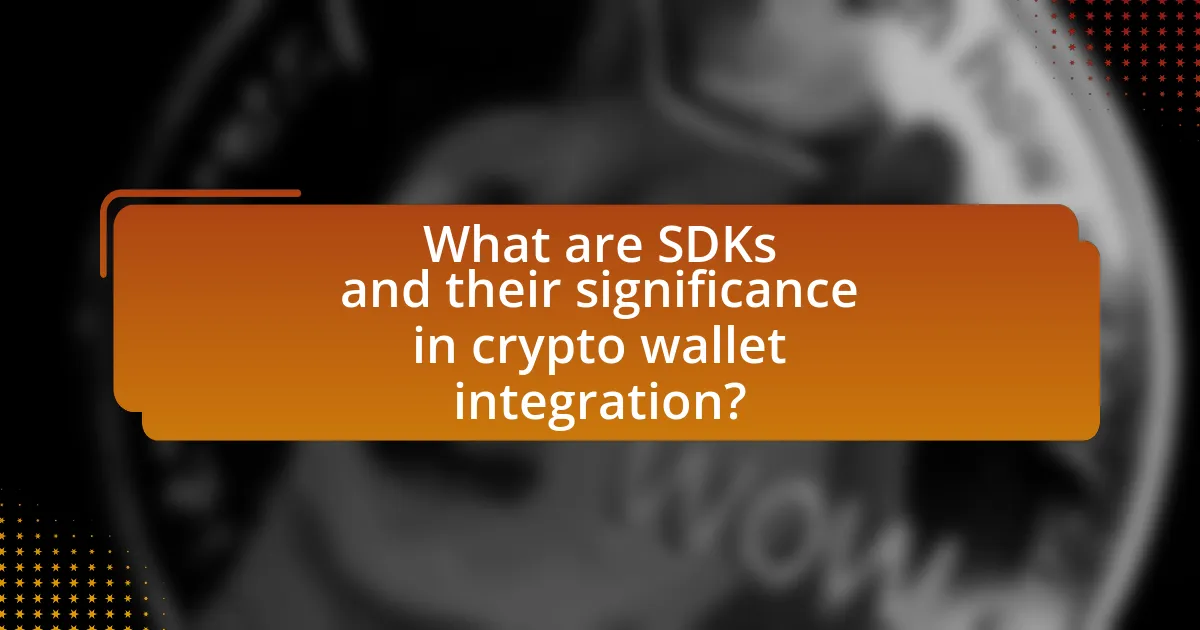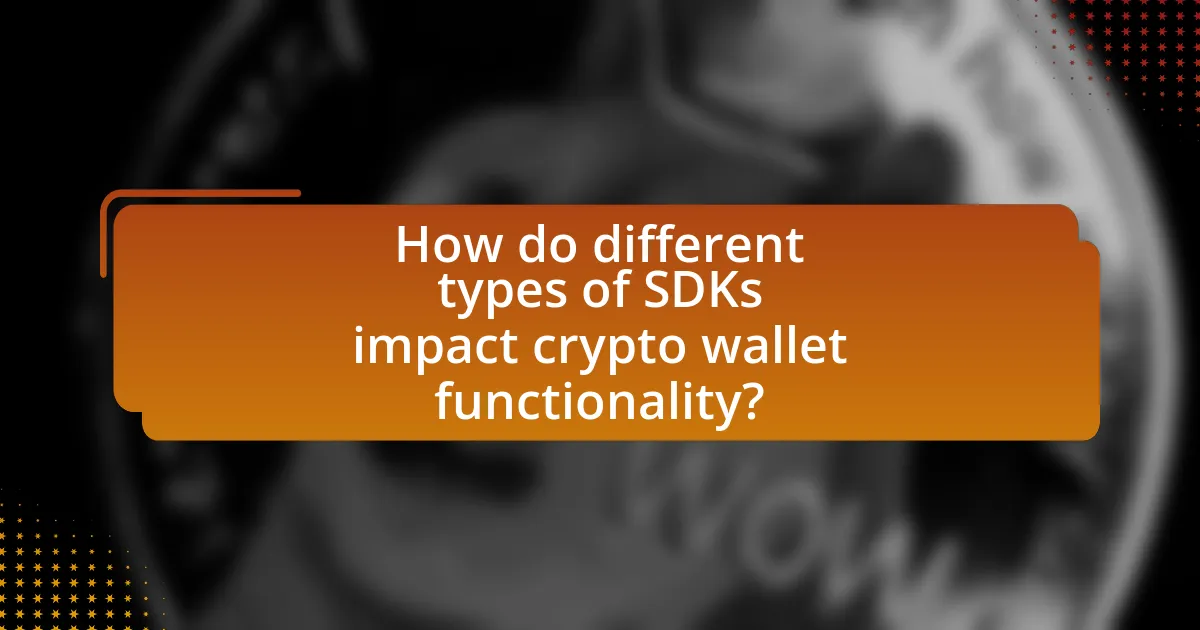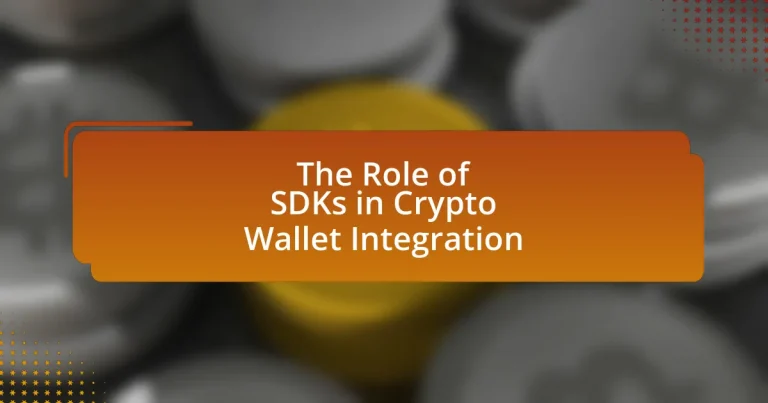SDKs, or Software Development Kits, are essential tools that facilitate the integration of crypto wallet functionalities into applications. This article explores the significance of SDKs in streamlining wallet development, highlighting their role in secure transaction processing, multi-currency support, and user authentication. It discusses how SDKs simplify the integration process for developers, the challenges faced without them, and the various types of SDKs available for different platforms. Additionally, the article addresses best practices for utilizing SDKs, the importance of security, and common pitfalls to avoid during integration, ultimately emphasizing the impact of SDKs on user experience and wallet functionality.

What are SDKs and their significance in crypto wallet integration?
SDKs, or Software Development Kits, are collections of tools, libraries, documentation, and code samples that facilitate the development of applications for specific platforms or frameworks. In the context of crypto wallet integration, SDKs are significant because they streamline the process of incorporating wallet functionalities into applications, enabling developers to implement features such as transaction processing, wallet management, and security protocols efficiently. For instance, SDKs provide pre-built functions that handle complex cryptographic operations, reducing the need for developers to write extensive code from scratch, which can minimize errors and speed up the development timeline. This efficiency is crucial in the rapidly evolving crypto landscape, where timely integration of wallet capabilities can enhance user experience and security.
How do SDKs facilitate the development of crypto wallets?
SDKs facilitate the development of crypto wallets by providing pre-built libraries and tools that streamline the integration of blockchain functionalities. These software development kits enable developers to implement essential features such as wallet creation, transaction processing, and security protocols without needing to build everything from scratch. For instance, SDKs often include APIs that simplify interactions with various blockchain networks, allowing developers to focus on user experience and application logic. This efficiency reduces development time and costs, as evidenced by the widespread adoption of SDKs in the crypto space, where companies like Coinbase and Binance have utilized SDKs to enhance their wallet offerings rapidly.
What are the key features of SDKs used in crypto wallet integration?
The key features of SDKs used in crypto wallet integration include secure transaction processing, multi-currency support, user authentication, and seamless API connectivity. Secure transaction processing ensures that all transactions are encrypted and protected against fraud, which is critical in the cryptocurrency space. Multi-currency support allows developers to integrate various cryptocurrencies, enhancing user flexibility and accessibility. User authentication features, such as biometric verification and two-factor authentication, provide an additional layer of security for wallet access. Seamless API connectivity enables easy integration with existing applications, facilitating smooth user experiences and efficient data exchange. These features collectively enhance the functionality and security of crypto wallets, making SDKs essential for developers in this domain.
How do SDKs simplify the integration process for developers?
SDKs simplify the integration process for developers by providing pre-built libraries and tools that streamline coding tasks. These software development kits encapsulate complex functionalities, allowing developers to implement features without needing to understand the underlying code intricacies. For instance, SDKs often include comprehensive documentation and sample code, which reduces the learning curve and accelerates development time. Additionally, SDKs ensure consistency and reliability by offering standardized methods for interacting with APIs, which minimizes errors and enhances the overall efficiency of the integration process.
What challenges do developers face without SDKs in crypto wallet integration?
Developers face significant challenges without SDKs in crypto wallet integration, primarily due to the lack of standardized tools and libraries that simplify the process. Without SDKs, developers must manually handle complex tasks such as cryptographic operations, transaction signing, and network communication, which increases the likelihood of errors and security vulnerabilities. Additionally, the absence of SDKs leads to longer development times, as developers need to build and test functionalities from scratch, which can delay project timelines and increase costs. Furthermore, without SDKs, maintaining compatibility with various blockchain protocols becomes more cumbersome, as developers must continuously update their code to accommodate changes in the underlying technology. These challenges highlight the critical role SDKs play in streamlining the integration process and enhancing security and efficiency in crypto wallet development.
How do SDKs address security concerns in crypto wallet development?
SDKs address security concerns in crypto wallet development by providing pre-built libraries and tools that incorporate best practices for encryption, authentication, and secure data storage. These software development kits often include features such as secure key management, which ensures that private keys are stored in a secure environment, reducing the risk of unauthorized access. Additionally, SDKs typically offer built-in support for multi-factor authentication and transaction signing, which further enhances security by requiring multiple verification steps before executing transactions.
For instance, many SDKs utilize industry-standard cryptographic algorithms, such as AES and RSA, to protect sensitive information. This adherence to established security protocols helps developers avoid common vulnerabilities and ensures that the wallet’s architecture is robust against attacks. Furthermore, SDKs often undergo regular security audits and updates, which help to identify and mitigate newly discovered threats, thereby maintaining a high level of security throughout the wallet’s lifecycle.
What are the potential risks of manual integration without SDKs?
Manual integration without SDKs poses several potential risks, including increased development time, higher chances of errors, and security vulnerabilities. Developers may face challenges in ensuring compatibility with various platforms and APIs, leading to inconsistent user experiences. Additionally, without the standardized tools provided by SDKs, the likelihood of introducing bugs or misconfigurations rises significantly, which can compromise the functionality of the integration. Security risks are heightened as manual processes may overlook critical security protocols, making the system more susceptible to attacks. According to a study by the Ponemon Institute, 60% of organizations reported that manual processes contributed to data breaches, underscoring the importance of using SDKs to mitigate these risks effectively.

How do different types of SDKs impact crypto wallet functionality?
Different types of SDKs significantly impact crypto wallet functionality by providing varying levels of integration, security features, and user experience enhancements. For instance, a blockchain SDK may offer direct access to blockchain nodes, enabling faster transaction processing and real-time data retrieval, while a payment SDK can streamline payment processing by integrating with multiple payment gateways. Furthermore, security-focused SDKs enhance wallet functionality by implementing advanced encryption methods and multi-signature capabilities, which protect user assets from unauthorized access. The effectiveness of these SDKs is evidenced by their widespread adoption in successful crypto wallets, such as Coinbase and MetaMask, which leverage specific SDKs to optimize performance and security, thereby improving overall user satisfaction and trust in the wallet’s capabilities.
What are the various types of SDKs available for crypto wallet integration?
Various types of SDKs available for crypto wallet integration include mobile SDKs, web SDKs, and server-side SDKs. Mobile SDKs, such as those for iOS and Android, enable developers to integrate wallet functionalities directly into mobile applications, facilitating transactions and user management. Web SDKs allow for the integration of wallet features into web applications, providing seamless user experiences for online transactions. Server-side SDKs support backend integration, enabling secure transaction processing and wallet management without exposing sensitive data to the client side. Each type of SDK is designed to cater to specific platforms and use cases, ensuring developers can implement crypto wallet functionalities effectively across different environments.
How do mobile SDKs differ from web SDKs in crypto wallet applications?
Mobile SDKs differ from web SDKs in crypto wallet applications primarily in their design and functionality tailored for specific platforms. Mobile SDKs are optimized for mobile operating systems, providing features like biometric authentication and push notifications, which enhance user experience on smartphones. In contrast, web SDKs focus on browser compatibility and often utilize web technologies such as JavaScript, HTML, and CSS, enabling integration with web applications. This distinction is crucial as mobile SDKs can leverage device-specific capabilities, while web SDKs prioritize cross-platform accessibility and responsiveness.
What role do blockchain-specific SDKs play in enhancing wallet features?
Blockchain-specific SDKs play a crucial role in enhancing wallet features by providing developers with the tools necessary to integrate blockchain functionalities seamlessly. These SDKs facilitate the implementation of features such as secure transaction processing, multi-currency support, and user authentication, which are essential for modern cryptocurrency wallets. For instance, SDKs like Web3.js enable developers to interact with Ethereum-based applications, allowing wallets to execute smart contracts and manage tokens efficiently. This integration not only improves user experience but also ensures compliance with blockchain protocols, thereby increasing the wallet’s reliability and security.
How do SDKs influence user experience in crypto wallets?
SDKs significantly enhance user experience in crypto wallets by providing developers with tools that streamline wallet integration and functionality. These software development kits enable developers to implement features such as secure transactions, user authentication, and real-time data access more efficiently. For instance, SDKs often include pre-built components that reduce the time and complexity involved in coding, allowing for a smoother and faster user interface. This efficiency can lead to improved user satisfaction, as users benefit from quicker transaction times and a more intuitive design. Additionally, SDKs often come with built-in security protocols, which help to protect user data and funds, further enhancing trust and usability in crypto wallets.
What user interface improvements can SDKs provide in wallet applications?
SDKs can enhance user interfaces in wallet applications by providing pre-built components, customizable templates, and streamlined integration processes. These improvements allow developers to create visually appealing and user-friendly interfaces more efficiently. For instance, SDKs often include ready-to-use UI elements like buttons, forms, and navigation bars, which can significantly reduce development time and ensure consistency across the application. Additionally, SDKs facilitate responsive design, ensuring that wallet applications function well on various devices and screen sizes. This adaptability is crucial as mobile usage continues to rise, with over 50% of global web traffic coming from mobile devices. By leveraging these features, wallet applications can improve user engagement and satisfaction, ultimately leading to higher adoption rates.
How do SDKs enhance transaction speed and reliability for users?
SDKs enhance transaction speed and reliability for users by providing pre-built functions and streamlined processes that reduce the complexity of integrating payment systems. These software development kits enable developers to implement optimized code for transaction handling, which minimizes latency and errors during processing. For instance, SDKs often include features like automatic retries and error handling, which ensure that transactions are completed successfully even in the event of temporary network issues. This reliability is crucial in financial applications, where delays or failures can lead to significant user dissatisfaction. Additionally, SDKs are designed to work seamlessly with various blockchain protocols, allowing for faster transaction confirmations and improved user experience.

What are the best practices for utilizing SDKs in crypto wallet integration?
The best practices for utilizing SDKs in crypto wallet integration include ensuring security, maintaining compatibility, and providing comprehensive documentation. Security is paramount; developers should use SDKs that implement strong encryption and adhere to industry standards to protect user data and transactions. Compatibility is crucial; selecting SDKs that support multiple platforms and cryptocurrencies enhances user accessibility and broadens the wallet’s functionality. Comprehensive documentation aids developers in understanding the SDK’s features and integration processes, which can significantly reduce development time and errors. These practices are supported by industry trends emphasizing security and user experience in financial technology, as highlighted in reports from organizations like the Blockchain Research Institute.
How can developers choose the right SDK for their crypto wallet project?
Developers can choose the right SDK for their crypto wallet project by evaluating factors such as compatibility with blockchain networks, security features, ease of integration, and community support. Compatibility ensures that the SDK can interact with the specific blockchain the wallet will support, while robust security features protect user assets and data. Ease of integration is crucial for reducing development time and complexity, and strong community support can provide valuable resources and troubleshooting assistance. For instance, SDKs like Coinbase Wallet SDK and WalletConnect are popular due to their extensive documentation and active user communities, which facilitate smoother development processes.
What factors should be considered when evaluating SDKs for integration?
When evaluating SDKs for integration, key factors include compatibility, documentation quality, support, security features, and performance. Compatibility ensures the SDK works seamlessly with existing systems and platforms, which is crucial for successful integration. High-quality documentation facilitates easier implementation and troubleshooting, reducing development time. Reliable support from the SDK provider can significantly impact the integration process, especially when issues arise. Security features are essential to protect sensitive data, particularly in crypto wallet applications, where vulnerabilities can lead to significant financial losses. Lastly, performance metrics, such as speed and resource consumption, are vital to ensure that the SDK does not negatively impact the overall application efficiency. These factors collectively contribute to a successful and secure integration of SDKs in crypto wallet systems.
How can developers ensure the security of their wallets when using SDKs?
Developers can ensure the security of their wallets when using SDKs by implementing best practices such as using secure coding techniques, regularly updating SDKs, and conducting thorough security audits. Secure coding techniques, including input validation and proper error handling, help prevent vulnerabilities that could be exploited. Regular updates to SDKs are crucial as they often include security patches that address newly discovered vulnerabilities. Additionally, conducting security audits allows developers to identify and mitigate potential risks in their wallet integration. According to a report by the Open Web Application Security Project (OWASP), secure coding practices can significantly reduce the risk of security breaches in applications.
What common pitfalls should developers avoid when integrating SDKs?
Developers should avoid several common pitfalls when integrating SDKs, including inadequate documentation review, failure to manage dependencies, and neglecting security practices. Inadequate documentation review can lead to misunderstandings of the SDK’s capabilities and limitations, resulting in improper implementation. Failure to manage dependencies may cause version conflicts or compatibility issues, which can disrupt the functionality of the application. Neglecting security practices, such as not validating inputs or overlooking secure storage of sensitive data, can expose applications to vulnerabilities. These pitfalls are critical to address, as they can significantly impact the performance and security of crypto wallet integrations.
How can inadequate testing affect the performance of crypto wallets using SDKs?
Inadequate testing can significantly degrade the performance of crypto wallets utilizing SDKs by introducing vulnerabilities and bugs that compromise functionality and security. When testing is insufficient, issues such as memory leaks, transaction failures, and slow response times may arise, leading to a poor user experience. For instance, a study by the International Journal of Information Security highlighted that 70% of security vulnerabilities in software are due to inadequate testing practices. This statistic underscores the critical need for thorough testing to ensure that crypto wallets operate efficiently and securely, thereby maintaining user trust and safeguarding assets.
What are the consequences of neglecting updates and maintenance for SDKs?
Neglecting updates and maintenance for SDKs can lead to security vulnerabilities, compatibility issues, and decreased performance. Security vulnerabilities arise because outdated SDKs may not include patches for known exploits, making applications susceptible to attacks. Compatibility issues occur when SDKs are not updated to align with new operating systems or libraries, potentially causing integration failures or malfunctions. Decreased performance can result from outdated code that does not leverage optimizations or improvements made in newer versions. For instance, a study by the Ponemon Institute found that 60% of data breaches are linked to unpatched vulnerabilities, highlighting the critical need for regular updates and maintenance in SDKs.
What practical tips can enhance the integration of SDKs in crypto wallets?
To enhance the integration of SDKs in crypto wallets, developers should prioritize comprehensive documentation and user-friendly interfaces. Comprehensive documentation ensures that developers can easily understand and implement the SDK features, reducing integration time and errors. User-friendly interfaces facilitate smoother interactions, making it easier for users to navigate and utilize wallet functionalities. Additionally, implementing robust testing protocols can identify potential issues early, ensuring a seamless user experience. Regular updates and community support further enhance integration by addressing bugs and incorporating user feedback, which is crucial for maintaining compatibility with evolving blockchain technologies.


